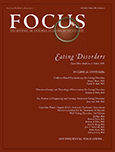Obesity: Is it a Mental Disorder?
Abstract
Objective:
Using Wakefield’s conceptualization of mental disorder as “harmful mental dysfunction” (Wakefield, Am Psychol, 47, 373–388, 1992), we examined the evidence for including obesity as a mental disorder in DSM-V.
Method:
We searched computer databases and examined reference lists from review articles published in the last 10 years to identify empirical papers relevant to the present review.
Results:
Obesity is a condition of heterogeneous etiology that is harmful for most individuals. However, there is scant evidence that obesity, in general, is caused by mental dysfunction. Although recent work examining the neurocircuitry of energy balance has suggested that mental dysfunction may be involved in the etiology of specific obesity phenotypes, findings are too preliminary to support classification of obesity as a mental disorder. Nevertheless, there is evidence that obesity is related to mental disorder and many of the medications used to treat psychiatric illness.
Discussion:
There is little evidence for including obesity as a mental disorder in DSM-V. However, results confirm the importance of monitoring adiposity routinely among patients with psychiatric illness. © 2009 American Psychiatric Association.
(Reprinted from the International Journal of Eating Disorders 2009; 42:739–753. Co-published by American Psychiatric Association.)



